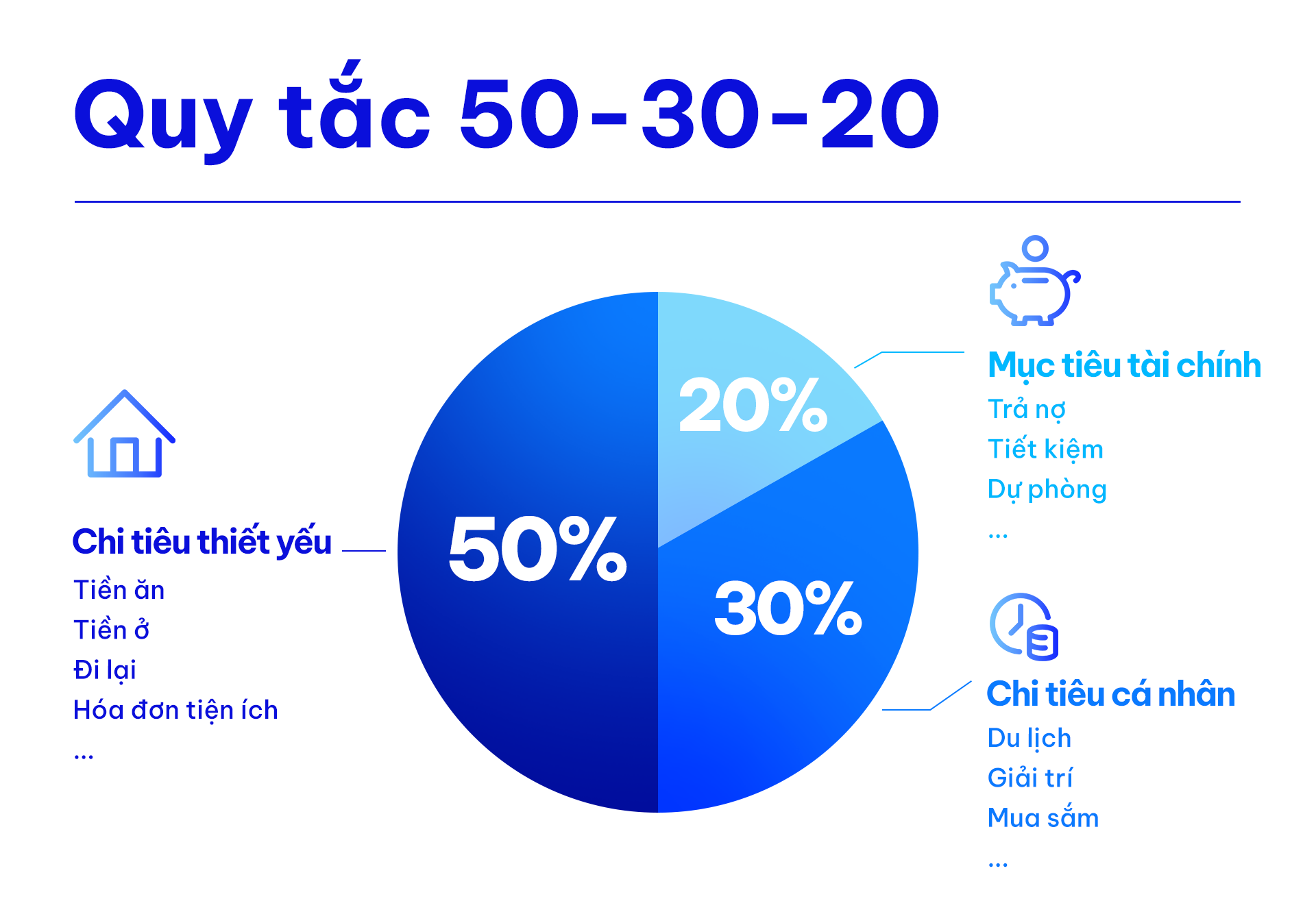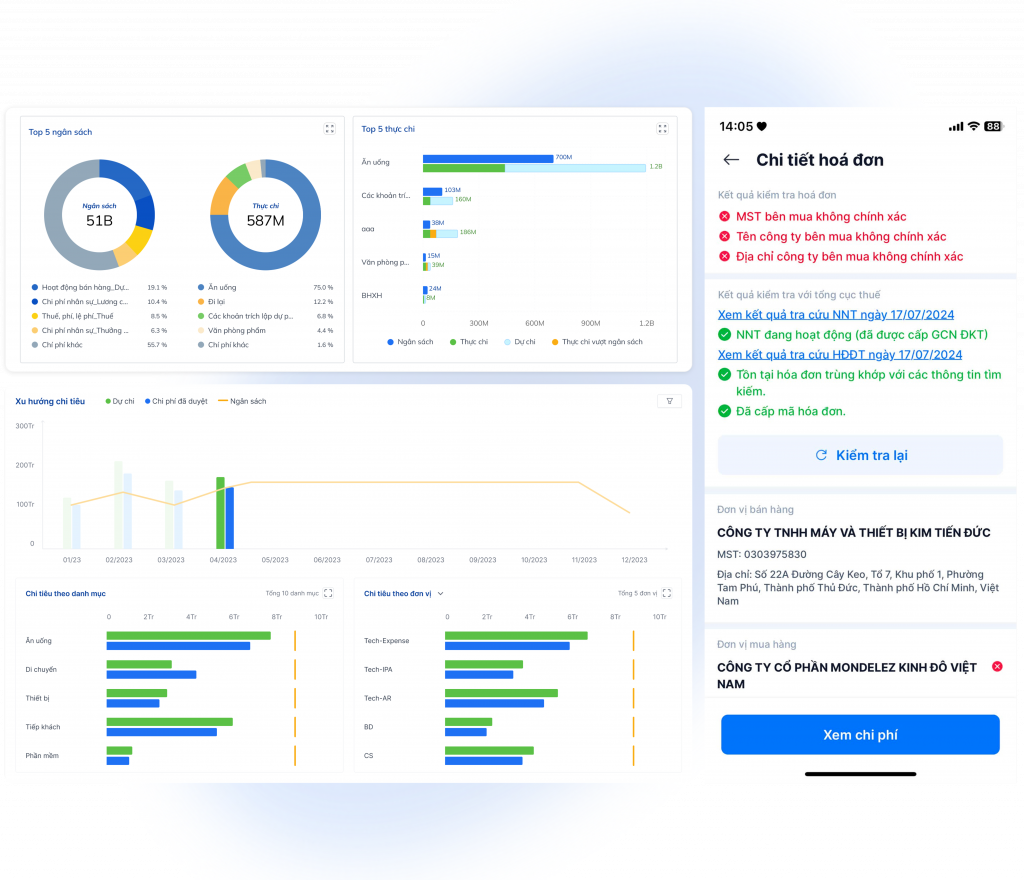Budgeting using the 50/30/20 method It is a popular personal finance management principle, but its core disciplines can be applied flexibly and offer valuable lessons for cost control and financial optimization at the corporate level.
50/30/20 is the allocation of net income into three main spending groups: 50% for essential needs, 20% for savings and investments, and 30% for personal/development spending.
This article by Bizzi will guide businesses on how to learn and apply the financial discipline from this rule to achieve efficiency in cost management through automation.
Learn about budgeting using the 50/30/20 method
What is the 50/30/20 method?
On a personal level, budgeting using the 50/30/20 method involves dividing your after-tax income into three main spending groups: 50% for essential needs, 20% for savings and investments, and the remaining 30% for personal expenses and entertainment. This is a simple, easy-to-apply formula that helps form healthy financial management habits.
Origin and details of the core 50/30/20 principle
This rule was popularized by Senator Elizabeth Warren and her daughter in the book “All Your Worth: The Ultimate Lifetime Money Plan.” Understanding the three spending groups at the personal level is the foundation before applying it to business:
- 50% Essential Needs: Are mandatory monthly expenses. For example: House rent (minimum payment), food, insurance.
- 30% personal wishes (Wants): Expenses that are not mandatory but enhance the quality of life. Examples: Eating out, entertainment subscriptions (Netflix, Spotify), non-essential clothing.
- 20% Savings & Debt Repayment: Prioritize Emergency Funds and Pay Off Debt Above Minimum to Minimize Interest.
Projection to a business context: Although designed for individuals, the basic principles of budgeting, controlling spending, and long-term planning of 50/30/20 are extremely important for businesses. We can interpret these spending groups for businesses as follows:
- “Essential Needs” (50%) – Core Operating Costs: Corresponds to mandatory expenses that are essential to maintaining daily business operations. For example:
- Employee benefits and salary costs.
- Office/factory rent, electricity, water, internet.
- Cost of raw materials, manufacturing, and basic services.
- Other fixed payments such as business insurance.
- Important principle: Businesses need to control this cost group not to exceed 50% of total revenue or operating budget to maintain stability.
- “Savings and Investments” (20%) – Reinvestment costs and strategic reserves: For building financial funds and investments to increase value and ensure sustainable development of the business. For example:
-
- Contingency/emergency fund (to ensure resilience in the event of market fluctuations or unforeseen incidents).
- Reinvest in technology, research & development (R&D) to enhance competitiveness.
- Expand market, invest in fixed assets.
- Pay off strategic debt (beyond required minimums) to improve financial health.
- “Flexible Spending/Development” (30%) – Expenses to drive growth and enhance experiences: Allocate to activities that drive growth, build your brand, and enhance the employee experience, which are not required but are important for motivation and development. For example:
-
- Marketing and advertising costs.
- Training to improve employee skills.
- Additional benefits, corporate culture building activities.
- New initiatives are groundbreaking but can be adjusted or cut back if needed without affecting core operations.
Benefits when businesses apply budgeting according to the 50/30/20 method
The 50/30/20 budgeting method is a popular financial management principle. Although it is often applied to startup budget, small business Or individuals can also flexibly apply the same principle in budget management. Below are the benefits when businesses apply budgeting according to the 50/30/20 method:
- Establish financial discipline: Help businesses form the habit of allocating resources in a planned manner, avoiding waste and overspending.
- Strict cost control: Create a clear framework to monitor and evaluate each expense, making it easy to spot and adjust ineffective spending.
- Ensuring financial stability: Setting aside 20% for savings and investment helps businesses build a solid reserve fund and have resources for long-term goals, minimizing financial pressure when facing incidents.
- Promoting sustainable growth: Proper allocation of development activities (30%) ensures that the business has sufficient resources to innovate, expand and maintain competitive advantage.
- Easy to monitor and adjust: Similar to individuals, businesses can regularly record, compare actual spending with budget and adjust plans promptly.
- High adaptability: Businesses can flexibly adjust the percentage depending on the industry, development stage, or market situation.

Challenges in applying 50/30/20 budgeting method in businesses
While there are many benefits to implementing the 50/30/20 budgeting method in business budget management, there are some major challenges, especially since the model was originally designed for individuals. Here are the main challenges businesses often face when applying it:
- Transaction complexity: Unlike personal finance, businesses have large transaction volumes, diverse types of costs, and involve many departments.
- Transparency and compliance requirements: All expenses must have valid invoices and documents, comply with legal regulations and internal policies. In particular, avoiding common invoice error situations is of utmost importance.
- Approval and control: A clear, automated spending approval process is needed to avoid bottlenecks and ensure efficiency.
- Lack of support tools: Manually managing these large and complex expense items is prone to errors, wasted time and resources. Many businesses are still stuck using this. Many businesses are still stuck using this. Excel spreadsheet is the "hidden enemy" in this work.
Comparing 50/30/20 with Zero-Based Budgeting (ZBB)
50/30/20 is a great guideline, but for large enterprises that need a high level of precision in project cost management, Zero-Based Budgeting (ZBB) is often considered the ideal next step.
- What is ZBB?: Instead of basing it on the previous year's budget (like 50/30/20), ZBB requires every spend to be justified and allocated from zero, ensuring every dollar has a clear purpose, aligned with specific short-term projects or campaigns.
- CFO perspective: 50/30/20 helps establish macro-discipline, while ZBB helps establish detailed micro-control by department. The role of the CFO in digital transformation is to guide businesses in choosing the appropriate budgeting method.
- Bizzi Bridge: To successfully apply ZBB or any detailed budgeting principle, businesses must have an automation tool to track and reconcile costs in real-time, something that Excel or manual 50/30/20 cannot do.
Comprehensive solution to help businesses spend their budget effectively
To overcome the challenges of manual cost control, Bizzi provides a comprehensive cost control system that automates the revenue and expenditure process with more than 30+ features, helping to streamline the process for the Finance and Accounting department.
Bizzi is an AI assistant for finance and accounting departments in automating revenue and expenditure processes. Bizzi is a platform that integrates more than 30+ features to help businesses streamline and automate cost management, debt collection, and B2B payment processes.
Bizzi Travel & Bizzi Expense budgeting and management features – “Assistant” to apply the 50/30/20 rule
If the 50/30/20 rule helps businesses shape how to allocate resources appropriately, then Bizzi Travel & Bizzi Expense is the tool that realizes that principle in daily operations.
- Flexible budgeting for each expense "jar"
- Create separate budgets for each department, project or campaign, tied to 50/30/20 spending buckets.
- Adjust limits periodically to suit business strategy and situation.
- Real-time spending monitoring and alerts
- All expenses from Bizzi Travel (travel expenses) and Bizzi Expense (operating expenses) are updated instantly and reconciled with the budget.
- Automatic alerts when close to or over budget.
- Smart approval process
- Multi-level approval by limit or expense type, ensuring control before it occurs.
- Fast yet transparent.
- Budget reporting and trend analysis
- Compare your budget with your actual spending for each 50/30/20 group.
- Analyze trends and make recommendations for adjustments.
Combine the 50/30/20 method with Bizzi Travel & Expense, businesses not only have clear principles but also have automatic monitoring tool, ensuring every penny spent goes to the right target.

In addition to the budgeting and management feature on Bizzi Travel & Expense, Bizzi also provides a comprehensive solution ecosystem to help businesses optimize each "jar" of expenses in the 50/30/20 model:
- Bizzi Travel & Expense – Unified solution for managing business expenses and operating expenses, allowing businesses to set budgets by department, project or each business trip. The automatic approval system and real-time budget overrun warnings help closely control the 50% essential expense group and the 30% flexible expense group. At the same time, the detailed reporting feature helps managers easily analyze and adjust budget plans to optimize capital efficiency.
- Processing and comparing input invoices (IPA + 3-way matching) – Automatically receive, read and compare invoices from suppliers with purchase orders and warehouse receipts. This emphasizes The importance of automated accounts payable solutions to ensure transparency of expenses in the 50% operating cost group.
- Electronic invoice (B-invoice) – Integrate the issuance, storage and lookup of electronic invoices in accordance with legal regulations. This solution helps businesses improve compliance, while creating a transparent foundation for both operating and investment costs.
- Accounts Receivable Management (ARM) – Automate the debt collection process and track cash inflows, ensuring financial resources are always available for the 20% group to save and invest. Effective debt management also helps reduce working capital pressure and increase the ability to reinvest.
By combining all of the above solutions, Bizzi not only helps businesses apply the 50/30/20 principle accurately, but also automates the entire cost management lifecycle, from budgeting, approval, spending, to reconciliation and performance analysis.
Through the article on budgeting according to the 50/30/20 method above by Bizzi, it can be seen that whether managing personal or business finances, applying the principles will be the key to achieving stability and sustainable development. Controlling costs systematically with the help of technology solutions like Bizzi helps businesses automate, streamline processes, minimize errors, and detect risks.
It is the secret to optimizing costs and finances, allowing businesses to allocate resources more effectively to achieve business goals. If your business wants to improve cost management efficiency in a superior way, build a strong financial system similar to the 50/30/20 budgeting principle, register here to receive free advice from our team of experts.: https://bizzi.vn/dat-lich-demo/


